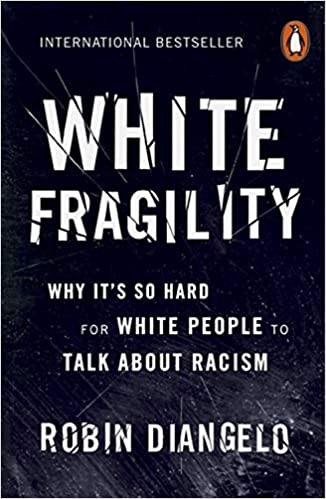Thought provoking book which aims to bring to the forefront the important subject of racism and how to discuss this with white people. Suggests that everyone is shaped by both their background and experiences so do therefore hold prejudices.
“Prejudice consists of thoughts and feelings, including stereotypes, attitudes, and generalizations
that are based on little or no experience and then are projected onto everyone from that group. There is a prevailing belief that prejudice is bad. Therefore when a white person is told they have racial prejudice they feel the need to defend their character rather than explore the inevitable racial prejudices they have absorbed and how these could be changed.” Discrimination is action based on prejudice.
Try to make visible the inevitable racist assumptions held and patterns displayed by white people who have been conditioned by living in a white supremacist culture. When doing this for yourself be objective and assess this by taking awaying your individualism.
Suggests when a white person’s patterns are named or questioned predictable responses occur.
Typically the responses begin with a set of unexamined assumptions, which, when questioned, trigger various emotions and activate some expected behaviors. These behaviors are then justified by numerous claims. These responses, emotions, behaviors, and claims are termed ‘white fragility’.
It is also important to note – perhaps if you are white there is some racism that you can’t see. In particular narratives describing the racial exceptionality obscure the reality of ongoing institutional white control, while reinforcing the ideologies of individualism and meritocracy.
Suggests that in society if a white child points at black man and comments on their skin then the mum will likely be embarrassed and try to silence them, whereas if a similar situation occurs and the child says he is handsome they are more likely to laugh.
White people tend to have a binary view on racism, that it is a good or bad. This means if you accuse a white person of being racist they tend to defend themselves, usually with the following two claims:
1. Claim to possess colour blindness, in which they ignore people’s colour. It is of note the book points out that not acknowledging race means that racism persists.
2. Claims to value diversity: “I know people of color [and/or have been near people of color, and/or have general fond regard for people of color]; therefore, I am free of racism.”
Then the white person generally feels the need to position the speaker as a good person who is free of racism. This swiftly ends the discussion and the issue is not thought about [by the white person] again.



